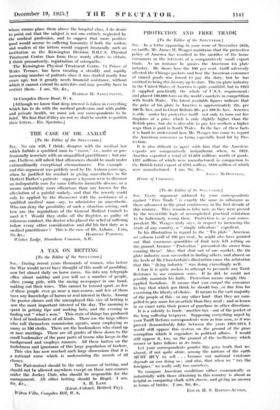PROTECTION AND FREE TRADE
[To the Editor of the timer:vine.]
a letter appearing in your issue of November 28th, on tariffs, Mr. James II. ‘‘'eager maintains that the protective policy of America has resulted in the sacrifice of the home consumers in the interests of a comparatively small export trade. As an instance he quotes the American tin plate industry. He shows how the 100 per cent. tariff adversely . affected the Chicago packers and how the American consumer of tinned goods was forced to pay the duty, but he has omitted to bring this history up to date. The tin plate industry in the United States of -America is quite youthful, but in 1924 it supplied practically the whole of U.S.A. requirements and placed 180,000 tons on the world's markets in competition with South Wales. The latest available figures indicate that the price of tin plate in America is approximately 22s. per 100 lb. box, and in Great Britain 20s. per 108 lb. box. America is able- - -under her protective tariff not only to turn out her tinplates at a price which is only slightly higher than the British price, but she is also able to pay her workers a higher wage than is paid in South Wales. In the face of these facts it is hard to understand how Mr. Wenger has come to regard the American consumer as being especially hard hit by Pro- tection.
It is also difficult to agree n ith him that the American exports are comparatively insignificant when, in 1924, America exported a total of £1,018 millions worth of goods, £497 millions of which were manufactured, in comparison to the British total export of 4:795 million, t018 million of which were manufactured. -I am, Sir, &c.,














































 Previous page
Previous page